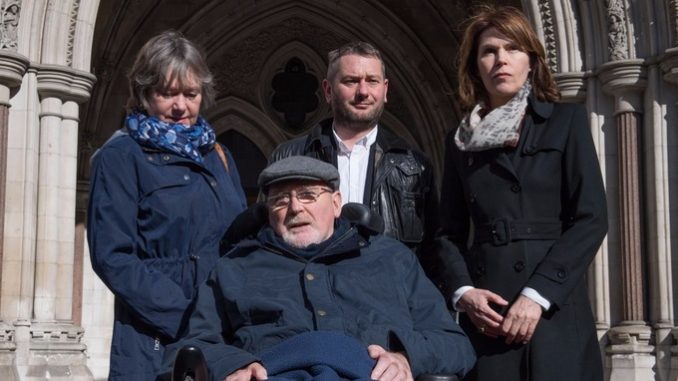
The High Court is to begin hearing the legal challenge of a terminally ill man who wants the right to die. Noel Conway, who is 67 and has motor neurone disease, wants a doctor to be allowed to prescribe a lethal dose when his health deteriorates further. He said he wanted to say goodbye to loved ones “at the right time, not to be in a zombie-like condition suffering both physically and psychologically”.
Any doctor who helped him to die would face up to 14 years in prison.
Mr Conway, of Shrewsbury, told the BBC: “I will be quadriplegic. I could be virtually catatonic and conceivably be in a locked-in syndrome – that to me would be a living hell. That prospect is one I cannot accept.”
British man dies at Dignitas centre
Assisted dying debate: The key questions
Mr Conway, a retired college lecturer, was once fit and active but motor neurone disease is gradually destroying all strength in his muscles. He cannot walk and increasingly relies on a ventilator to help him breathe. As his disease progresses, he fears becoming entombed in his body. Mr Conway is too weak to come to court from his home but his lawyers will say he wants the right to a peaceful and dignified death while he is still able to make the decision.
Mr Conway is being supported by the campaign group Dignity in Dying.
The last major challenge to the law was turned down by the Supreme Court three years ago. It ruled that while judges could interpret the law it was up to Parliament to decide whether to change it. In 2015 MPs rejected proposals to allow assisted dying in England and Wales, in their first vote on the issue in almost 20 years. Supporters of the current legislation say it exists to protect the weak and vulnerable from being exploited or coerced.
The case is expected to take up to four days.
Right to die laws
Assisted suicide – helping or encouraging another person to kill themselves – is illegal under English law.
Under the terms of the Suicide Act (1961) for England and Wales, it is punishable by up to 14 year’s imprisonment. In Scotland, helping someone take their own life could lead to prosecution.
There have been several attempts to change the law, as well as some high-profile cases that have challenged it.
In 2012, an MP in Scotland drafted an Assisted Suicide Bill. Margo Macdonald, who lived with Parkinson’s Disease, wanted people with terminal, life-limiting or life-shortening diseases to have the right to end their lives, aided by a lethal prescription from a doctor. It was debated and defeated in the Scottish Parliament in 2015.
In 2014, another Bill, introduced by Lord Falconer, was debated in the House of Lords in England. This Bill said terminally ill, mentally competent adults should be entitled to an assisted death if it was approved by two doctors and the High Court. It made good progress but eventually ran out of debating time before the 2015 general election.
In 2015, Labour MP Rob Marris took up the fight that Lord Falconer had begun and introduced an Assisted Dying Bill based on the earlier version. Months later, the Bill was defeated in the Commons with 330 MPs voting against it.
Noel Conway is the first terminally ill patient who is going to the High Court to argue for a right to an assisted death based on the failed vote in Parliament.
Source bbc.co.uk




Be the first to comment